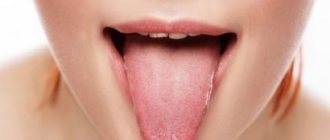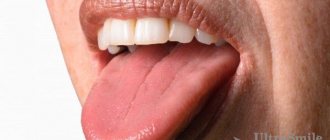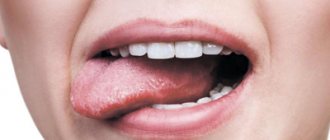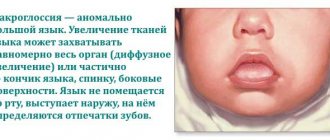Dry mouth is an unpleasant sensation that can be a symptom of serious illnesses. If dry mouth occurs constantly or frequently, it is necessary to understand the cause that is causing it and, if necessary, begin treatment. Elimination of dry mouth, as a rule, is achieved only as a result of treating the underlying disease, which should be the true goal. In any case, the feeling of dry mouth is another reason to pay attention to your health.
Dry mouth is caused by insufficient hydration of the oral mucosa, mostly due to insufficient saliva production. In medicine, dry mouth caused by a cessation or decrease in saliva production is called xerostomia.
.
Quite often, dry mouth occurs in the morning or at night (that is, after sleep).
Symptoms associated with dry mouth
Dry mouth in most cases manifests itself as a complex of symptoms described as:
- "viscosity" or "stickiness" in the mouth;
- thirst;
- irritation of the oral mucosa (burning and itching), the appearance of a bright border of the lips, cracks on the lips and in the corners of the mouth;
- dry tongue. The tongue turns red and becomes rough. It becomes more difficult to speak, chew and swallow. Decreased taste perception;
- dry throat. The voice becomes hoarse and more hoarse;
- there is an unpleasant odor from the mouth.
Symptoms
If constant dryness and a bitter taste on the oral mucosa are accompanied by such signs as heartburn, a grayish-white coating on the tongue, belching, this usually indicates:
Why does a white coating appear on the tongue?
- for biliary dyskinesia;
- gingivitis (inflammation of the gums);
- gastritis;
- cholecystitis;
- duodenal or gastric ulcer;
- cholelithiasis (GSD).
Alarming symptoms that should be a reason to visit a doctor are: a constant feeling of thirst (a “signal” of diabetes), dryness not only in the mouth, but also in the throat, nasal mucosa, painful swallowing, burning on the tongue and increased viscosity of saliva. Manifestations such as fetid putrid odor from the mouth, changes in timbre, hoarseness of voice, and changes in taste sensations should cause concern.
Refusal of “heavy” indigestible foods is an important component of the complex treatment of any diseases of the digestive tract.
Thus, thirst, frequent urination, sudden weight gain (loss), skin rashes and itching, strong appetite are classic symptoms of diabetes mellitus, for which it is necessary to seek help from an endocrinologist. Xerotomia in combination with abdominal pain is usually an indicator of intestinal diseases.
Diarrhea, vomiting, problems with stool (constipation, diarrhea), “haunting” the patient for more than a month, indicate the so-called irritable bowel syndrome. It is noteworthy that these manifestations worsen after intense physical exertion or stress. Dry mucous membranes combined with weakness and dizziness are symptoms of hypotension (low blood pressure).
The appearance of a grayish-white coating on the tongue in combination with dryness and bitterness in the mouth indicates serious disruptions in the functioning of the stomach, intestines, liver, duodenum and gall bladder. Emergency hospitalization is required:
- with confusion, lack of coordination, pre-fainting;
- partial or complete immobilization of the facial muscles;
- respiratory dysfunction;
- swelling of the lips and tongue.
These symptoms “signal” about severe poisoning, an allergic reaction, which can lead not only to serious systemic disorders, but also death.
Causes of dry mouth that are not pathological
In some cases, dry mouth is not associated with a medical condition. For example:
- Dry mouth can occur in the morning and at night due to intoxication. This is a typical situation after drinking too much the night before.
- When nasal breathing is impaired, a person breathes through his mouth during sleep. The mouth is slightly open, and the oral mucosa dries out faster. Nasal breathing can be impaired due to a runny nose, nasal polyps, or a deviated nasal septum. A similar situation occurs with snoring. The cause of snoring in most cases is a decrease in the tone of the soft palate. Muscle weakening develops with age. This is why older people snore more often, and their oral mucosa becomes dry. This reason explains dry mouth in the morning in the elderly in most cases.
- If you don't drink enough fluids in hot weather, you shouldn't be surprised by dry mouth. A similar effect can be caused by eating highly salted foods.
- Many medications can cause dry mouth.
- Smoking is another common cause of dry mouth.
- Dry mouth can be one of the symptoms of menopause.
Diseases that may cause dry mouth
Dry mouth can be caused by high fever and intoxication due to various infectious diseases (flu, sore throat, etc.). Diseases associated with large loss of fluid as a result of vomiting or diarrhea (cholera, dysentery) can also cause dry mouth. In such cases, dry mouth is one of many symptoms and does not attract special attention.
If dry mouth is combined with diarrhea, flatulence, belching, nausea and pain in the left side of the abdomen, then this may indicate pancreatitis.
Dry mouth in combination with a bitter taste, heartburn, white or yellow coating on the tongue can indicate diseases of the gastrointestinal tract such as gastritis, duodenitis, cholecystitis.
Dry mouth can also occur with:
- diseases of the salivary glands;
- endocrine diseases (diabetes mellitus, thyrotoxicosis);
- neoplasms of the oral cavity (benign and malignant);
- damage to nerve endings that contribute to the functioning of the salivary glands;
- anemia;
- vitamin A deficiency;
- systemic diseases (scleroderma, Sjogren's disease, cystic fibrosis).
Causes
As a rule, diseases of the gastrointestinal tract (GIT), in particular the biliary tract, lead to a feeling of dryness and bitterness in the mouth. A bitter taste in the mouth is a consequence of the release of bile into the esophagus. So, the most likely causes of dryness and bitterness are the following diseases:
- cholecystitis;
- gastritis;
- ulcerative lesions of the duodenal and gastric mucosa;
- cholelithiasis;
- inflammatory processes in the intestines.
Other possible causes of bitterness and dry mouth: dental problems, dysguesia (changes in taste), hormonal imbalance in the body, poisoning with heavy metal salts. Neurological disorders can also lead to dry mucous membranes and a bitter taste in the mouth (for example, such symptoms often appear in people who constantly face stressful situations).
Bitterness and nausea in the morning are common problems among pregnant women. Due to the fact that in the first trimester the hormone prolactin is actively synthesized (responsible for the safety of the fetus), the tone of the muscular valve between the stomach and esophagus decreases - part of the acid, along with food particles, is thrown into the latter.
A temporary bitter taste in the mouth may be a consequence of yesterday's overeating, a runny nose, or occur against the background of hormonal imbalance during pregnancy.
In late pregnancy, such symptoms are a consequence of pressure from the enlarged uterus on the diaphragm and, as a consequence, the gallbladder and stomach. Dehydration (dryness) of the oral mucosa is a side effect of taking various groups of medications. Thus, the amount of saliva produced decreases with prolonged use of antibacterial and antihistamines, sedatives, painkillers, diet pills, diuretics, and antiemetic drugs.
If these symptoms occur at night or early in the morning, this usually indicates a violation of nasal breathing during sleep (for example, with a runny nose), allergies, eating “heavy” food for dinner, low humidity in the room, hormonal disorders (with pregnancy, including), renal dysfunction.
Why is it still bitter and dry in the mouth:
- ARVI;
- feverish conditions;
- undergone chemotherapy, radiation;
- head injuries, surgical interventions;
- intoxication of the body;
- smoking.
Thus, dry mucous membranes (xerotomia) accompanies the course of many infectious and inflammatory diseases and occurs against the background of elevated body temperature and fever. More serious diseases can also provoke such a problem - for example, the appearance of malignant neoplasms or autoimmune processes in the body (in particular, Sjögren's syndrome, which affects the salivary glands).
Impaired bile flow in various gastrointestinal diseases is the most common cause of constant bitterness in the mouth. Poorly performed dental treatment is also fraught with xerotomy and bitterness in the mouth, especially if the patient has an allergic reaction to certain drugs or elements of dentures (metals).
Eliminate dry mouth
If dry mouth is caused by drinking alcohol and smoking, then it can only be eliminated by getting rid of the bad habit. It is recommended to reduce the consumption of salty and sweet foods. Pay attention to how you breathe - through your nose or mouth. If nasal breathing is difficult, the cause must be diagnosed and nasal breathing restored. To do this, you will have to see a doctor. It is also important to monitor the humidity in the room.
Dry mouth can be the first symptom of many diseases. Therefore, if you often experience a feeling of dry mouth, it is necessary to understand its nature, determine the cause and, if necessary, consult a doctor and begin treatment for the disease that caused this symptom.
How to get rid of bitterness in your mouth
If the bitterness and unpleasant taste are not caused by pathologies of the gastrointestinal tract and other diseases, then you can “fight” them yourself:
- Maintain good oral hygiene. You need to brush your gums and tongue, not just your teeth. Add a small amount of baking soda to your toothbrush before applying toothpaste. Brushing your teeth and tongue should take at least two and a half minutes. Remember to brush your teeth twice a day. Use dental floss and a tongue scraper and rinse your mouth regularly;
- eat more citrus fruits, drink orange and lemon juices. The acid stimulates the production of saliva and eliminates the bitter taste in the mouth;
- Visit your dentist regularly for preventive examinations and dental plaque removal;
- stop smoking;
- drink enough water;
- limit your consumption of fatty and spicy foods. Eat slowly, chewing your food thoroughly.
If you follow all these rules, and the bitterness in your mouth persists, consult a doctor, as the cause of unpleasant symptoms may be endocrine diseases, mental disorders, and pathologies of the gastrointestinal tract.
Related services: Consultation with a pediatrician Consultation with a family doctor
Which doctor should I contact for dry mouth?
If you complain of dry mouth, you can contact your dentist or general practitioner (GP or family doctor). After identifying the cause that caused the feeling of dryness, you may be redirected to an endocrinologist, gastroenterologist or rheumatologist.
Most likely, you will need to undergo various tests (general blood count, general urinalysis, blood test for thyroid hormones, biochemical blood test, serological test), and, if necessary, undergo some instrumental studies (ultrasound, radiography, computed tomography).
Prevention
To avoid the appearance of a bitter taste in the mouth and xerotomy, it is recommended:
- timely treatment of infectious-inflammatory and dental diseases, elimination of digestive problems;
- normalization of work and rest regimes;
- refusal of heavy (fried, fatty, etc.) foods, smoking and alcohol;
- air humidification in working and living areas;
- control of the psycho-emotional state to avoid the occurrence of neurological problems.
Thus, the feeling of bitterness and dryness of the oral mucosa are signals notifying about various malfunctions in the body. As a rule, the “culprits” are diseases of the digestive tract (especially the biliary tract), but the problem can also be caused by dental, respiratory, hormonal and neurological disorders. In any case, when the discomfort is not temporary, but permanent, accompanied by thirst, vomiting, abdominal pain and other unpleasant symptoms, it is necessary to seek help from a doctor and undergo treatment.







